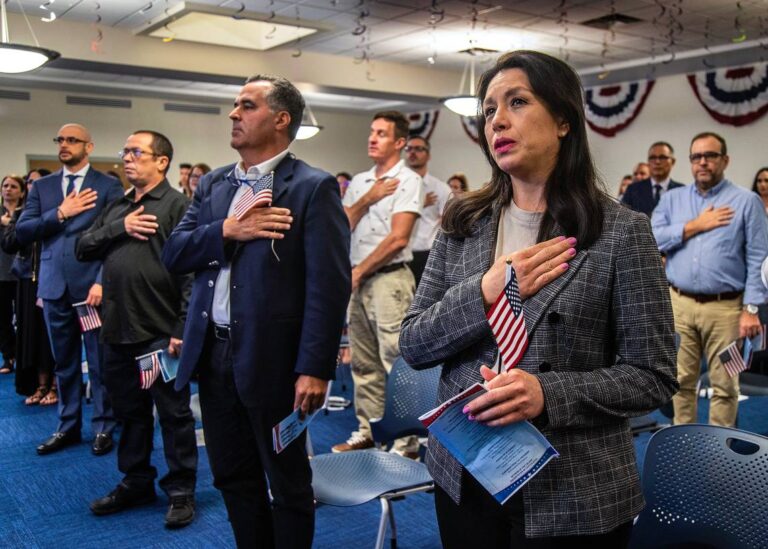I immigrated to the United States from Syria in 2005 to work as a gastroenterologist, and I specialize in the diseases and disorders of the digestive system. Thinking like a doctor, I seek to diagnose problems and consider lists of treatments. Thinking like an immigrant, I focus on freedom, the rule of law and the dreams of millions embarking upon new lives.
When these views converge, I begin to see some of our country’s leading politicians, in their desperate struggle for power, manipulating images of immigrants. The result is an issue framed in extreme terms — dark visions of “illegals” sneaking over borders clash with warm stories of proud new citizens fueling America’s economy. This collision of fear and hope leads me to wonder if our immigration issue is psychological rather than physical. Is the presence of immigrants a threat or do we have unresolved memory loss?
Is it amnesia? According to the U.S. Census Bureau’s latest data, almost 9 million people identify, at least partially, as American Indians or Alaska Natives. This is about 3% of the entire U.S. population. The other 97% of us, or our ancestors, arrived here from elsewhere. Do we constantly forget we’re almost entirely a nation of immigrants? At what point in our lives does “Americanness” replace “immigrant-ness”? Why do descendants of immigrants suddenly become hesitant to welcome new neighbors?
For further diagnosis, a doctor might next check homeostasis — or the state of balance among all bodily systems. Earlier this year a major admission of possible imbalance came from National Association of Manufacturers President Jay Timmons, who urged that the United States allow more legal immigration. Timmons said the country currently has “779,000 open jobs and not enough Americans to fill these vacancies.” In other words, we have more work than workers.
This is despite nearly 1 million immigrants becoming U.S. citizens last year, a surge due to a COVID-19 pandemic backlog. Timmons’ argument leads to the rational conclusion that we simply ought to welcome more immigrants. However, the unproductive pedantry around the topic only leads to complex policies preventing us from ever reaching homeostasis.
Perhaps clearer health guidelines could help? Given the matter’s complexity, one can understand why the last major immigration overhaul occurred decades ago, with every significant effort since President Ronald Reagan’s failing. Republican President George W. Bush almost compromised with Democrats in 2007 and Democrat Barack Obama came close to reforms in 2013. Immigration, as an institution, has been on its last breath since Reagan, held together by legislative Band-Aid solutions to larger problems.
There is a policy, however, that no party could argue against. The U.S. government has a program that sends immigrant doctors to parts of America lacking medical care. Back when I immigrated in 2005, arriving from Aleppo, Syria, I was involved in such a program, helping thousands deal with hepatitis and the scourge of drug addiction in Fort Smith, Arkansas. As time passed, I secured a green card, became a U.S. citizen and settled in the Tampa Bay area.
Since the outbreak of the Syrian war in 2011, several members of my immediate family have immigrated here. They were driven out by the criminal regime of Bashar al-Assad and his backers, Iran and Russia. Assad is a butcher who caused more than 13 million refugees and more than 600,000 deaths. Some of my family risked their lives to escape. In total, six siblings and their families now enjoy the American Dream. My brothers Mohab and Suhaib and sisters Walaa and Duaa work in medicine, dentistry and pharmaceuticals.
Our family’s youngest two boys immigrated in 2012. They overcame their lack of knowledge of English and pursued the American Dream despite a 10-year-long haul with immigration. Mohamad is soon to attend Georgetown University School of Medicine while Ahmad is finishing undergraduate studies at USF and pursuing dental school.
My father passed away in 2014. I believe he couldn’t be any prouder of us and what we have achieved. His oldest son, a Syrian immigrant gastroenterologist, lives among vital members of society, each uniquely dedicating their lives to future generations.
We live here. We pay taxes. We legally vote. We proudly give back to the country that welcomed us hoping America flourishes for our families and yours. We fought for a seat at the table, hoping we don’t forget where we came from, hoping we don’t develop the amnesia, and we continue to invite others to the table with us.
Maybe my family’s presence is an extension of something said by a founding father. George Washington, though not a doctor, offered many cures for our nation’s earliest challenges. On immigration, Washington wrote, “The bosom of America is open to receive not only the Opulent and respected Stranger, but the oppressed and persecuted of all Nations and Religions; whom we shall welcome to a participation of all our rights and privileges.”
The American Dream is contingent on the immigrants who fulfill it. And once they fulfill it, it is their duty to keep it alive.
Dr. Ihab Herraka is a member of Citizens for a Secure and Safe America, an NGO promoting democracy in Syria. He works as a gastroenterologist at Gastro Florida In Wesley Chapel.

